As the end of summer approaches, many young people are leaving home. High schoolers are heading to college or away for work, and university students are trekking the country to start their own lives. But what about the hometowns and cities they leave behind? Do they have an obligation to stay and support the towns that nurtured them into adulthood?
This decision is especially difficult for young people from small towns or close-knit communities. They find themselves facing a personal dilemma that pits their own futures against the future of their community.
Attempting to forge your own path while struggling with a sense of responsibility to your hometown or city is not to be taken lightly. Although it is imperative to look at the positives and negatives of both staying and leaving, it is even more important to understand that the decision must be your own.
To aid your decision-making, take a look at the reasons people choose to stay or leave and the potential repercussions and benefits of each.
Should I Go?
Those who leave note the pull of economic and employment opportunities elsewhere as the main factor motivating their departure. As most families do not settle in college towns, young people seeking higher education at a university or vocational school are practically forced to leave. For some, moving away for college is the first step to permanently leaving.
They accept that their town does not have jobs in their chosen career field, or that the opportunity for socio-economic mobility is limited. Perhaps they want to find an area more aligned with their political or religious views.
A Vox research group found that those who left their hometowns ended up more educated, more cosmopolitan and wealthier than those who stayed. They were also more likely to attend high school reunions — just in case that influences your decision to stay or go.
Unfortunately, attitudes of tribalism often permeate small towns and communities, so, when someone leaves, it is seen as a snub against the whole community. Your decision to leave might be completely logical and have nothing to do with personal misgivings about the town — it is simply the choice that will give you your best chance at a successful life. But to those who get left behind, it can feel like abandonment and ingratitude. Visits home might leave you feeling like an outsider, out-of-touch with the world you were raised in.
On the other hand, some towns actively encourage their “achievers,” those who show potential early in life, to return with resources and skills that will benefit the community.
“These return migrants come back to fill professional jobs that are hard to fill,” Vox finds. “They come back with life experiences to spur economic growth. And they come back because they care about the people at home.”
Returning, whether permanently or just for those high school reunions, is the most difficult part of leaving. If you leave, cutting all ties and never looking back, you can effectively forget about the town. But returning means facing the reality of what has become of your home. Though the town remains unchanged in your memories, it will likely be different when you return.
Your old street might be in disarray, the public park might have become a parking lot, neighbors might have passed away and the very atmosphere could be harsher than you remember. The changes can be positive — a new school, better housing or more jobs. But the town to which you return might not be the town you left behind.
Recognizing that change is inevitable, it is important to not get discouraged or regret your decision to leave. If you leave and the town crumbles, it is not a reflection of your actions or faults. Your staying could not have saved the town from decline. And should the town improve in your absence, it does not mean you are insignificant to the community.
If you feel inclined to return and help your community, you should do so. Don’t let others convince you that you are stifling your own potential by returning. And if you choose to close that chapter of your life, do not feel guilty for leaving and staying away. Your responsibility is to you and your future — even if that future does not include your hometown or city.
Should I Stay?
There is certainly a comfort in knowing your children will grow up surrounded by family — that they will play in the same streets, attend your old school and experience the same town traditions that decorate your childhood memories.
With 4 in 10 Americas never leaving their hometown, these personal connections are increasing the likelihood of staying over leaving. But the choice to stay is not always motivated by such optimistic factors. Some young people do not have the financial ability to leave, and familial obligations, rather than loyalty, often force them to stay.
“There is a value judgment often made with people who don’t leave their hometown,” Dan Cox, a researcher at the Public Religion Research Institute, told Vox. “[T]hat there’s something wrong with that decision.”
Those who stay in their hometowns are more likely to be less educated and hold more prejudices than those who leave. At first glance, this seems to condemn the decision to stay, especially if it is voluntary and not coerced by circumstance.
But years of formal education does not determine your success and happiness. Those who stay tend to be less educated because they often do not (or cannot) pursue higher education. They are more likely to hold these prejudices because they are surrounded by the same people and environment their entire lives, not because they are inherently malignant.
Deciding to stay is an equally valid decision as leaving, and it does not insinuate that you are failing to reach your full potential. This is a ludicrous, baseless stereotype.
Another factor to consider is that your hometown will change in this case, too. Just because you stay does not mean it remains stagnant, and your effort to preserve it does not equate permanence. Those who leave will return to find their home different, but you will have to watch it change.
This process is, in some ways, fun and exciting. You have the opportunity to watch your hometown expand and thrive. If you are a member of town councils or community organizations, you might even have influence over when and how these changes occur.
But change is not always for the better. You will have a front row seat should hardships befall the community and are likely to suffer yourself. Unlike those who leave, you are tied directly to your hometown and its fate.
Also consider that any decision you make can be undone. If you leave, you can return. If you stay, you can one day venture out. And neither decision is superior to the other. Choosing to leave does not guarantee success, and choosing to stay does not condemn you to a life of untapped potential.
Make the decision that is best for you. Although you might feel a sense of duty or obligation to your hometown, your true responsibility is to yourself and your own happiness. It is not selfish to take care of your own needs by putting yourself first, whether that means staying or leaving. You can’t take care of your hometown if you don’t first take care of yourself.
















